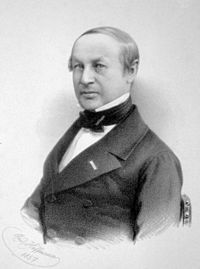Theodor Schwann
| Theodor Schwann | |
|---|---|

Theodor Schwann
|
|
| Born |
7 December 1810 Neuss, First French Empire (now in Germany) |
| Died | 11 January 1882 (aged 71) Cologne, German Empire |
| Fields | Biology |
| Education |
Humboldt University of Berlin (1834) University of Bonn University of Würzburg |
| Known for |
Cell theory Schwann cells Pepsin |
| Influences | Johannes Peter Müller |
| Notable awards | Copley Medal (1845) |
Theodor Schwann (7 December 1810 – 11 January 1882) was a German physiologist. His many contributions to biology include the development of cell theory, the discovery of Schwann cells in the peripheral nervous system, the discovery and study of pepsin, the discovery of the organic nature of yeast, and the invention of the term metabolism.
Schwann was born in Neuss. His father was a goldsmith, later a printer. Schwann studied at the Dreikönigsgymnasium in Cologne, and then at Bonn, where he met physiologist Johannes Peter Müller.
It was during the four years spent under the influence of Müller at Berlin that Schwann's most valuable work was done. Müller was at this time preparing his great book on physiology, and Schwann assisted him in the experimental work required. Schwann observed animal cells under the microscope, noting their different properties. Schwann found particular interest in the nervous and muscular tissues. He discovered the cells that envelope the nerve fibers, now called Schwann cells in his honor.
Schwann discovered the striated muscle in the upper esophagus and initiated research into muscle contraction, since expanded upon greatly by Emil du Bois-Reymond and others. Müller directed Schwann's attention to the process of digestion, and in 1837 Schwann isolated an enzyme essential to digestion, which he called pepsin.
...
Wikipedia
